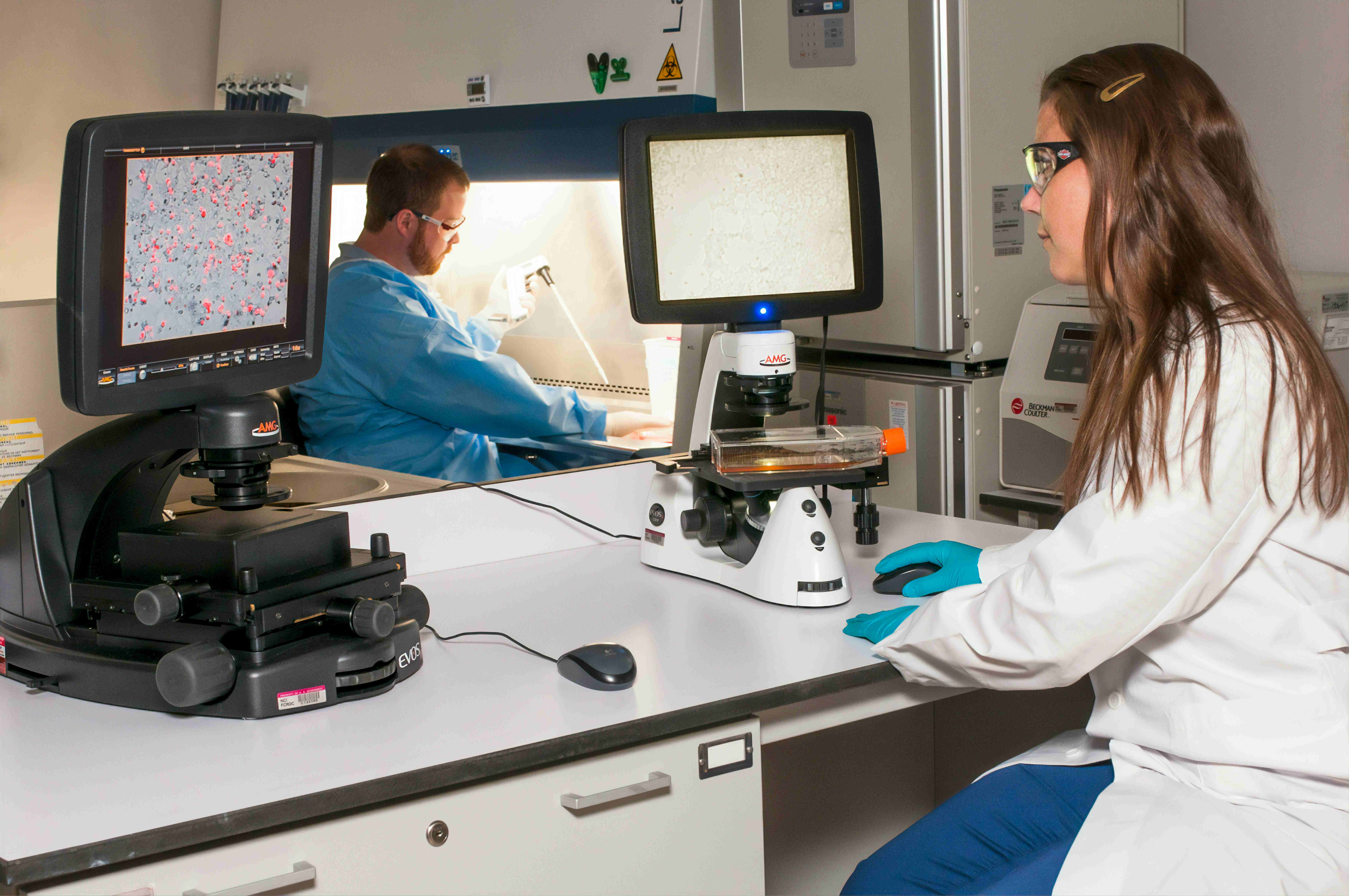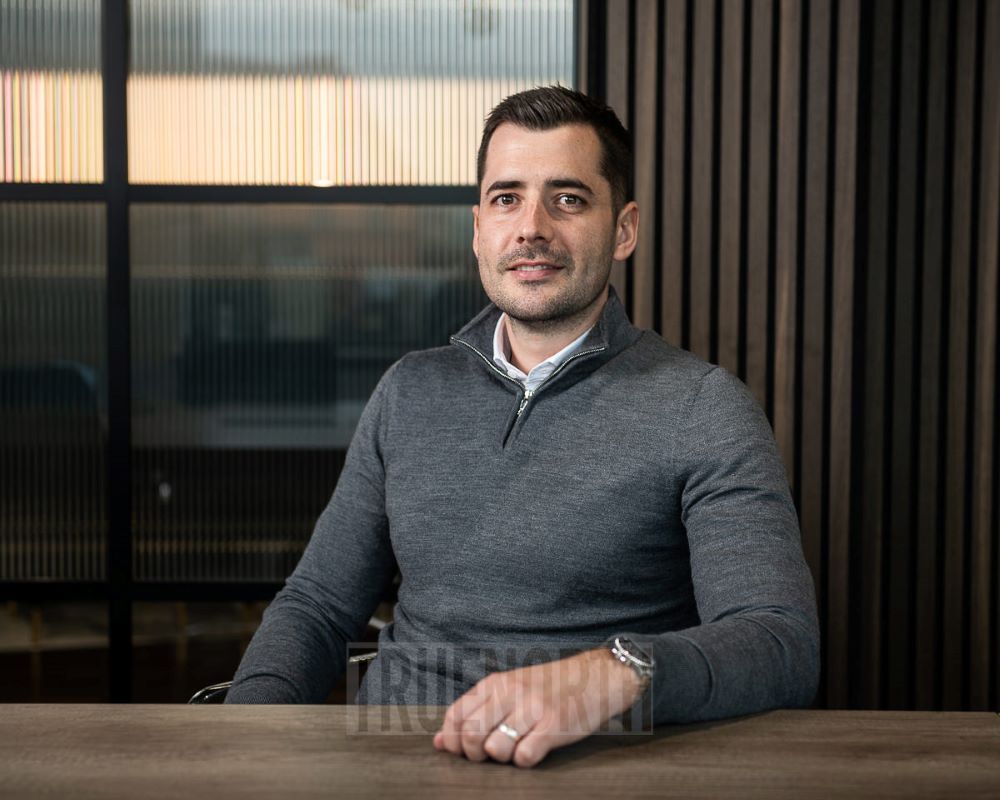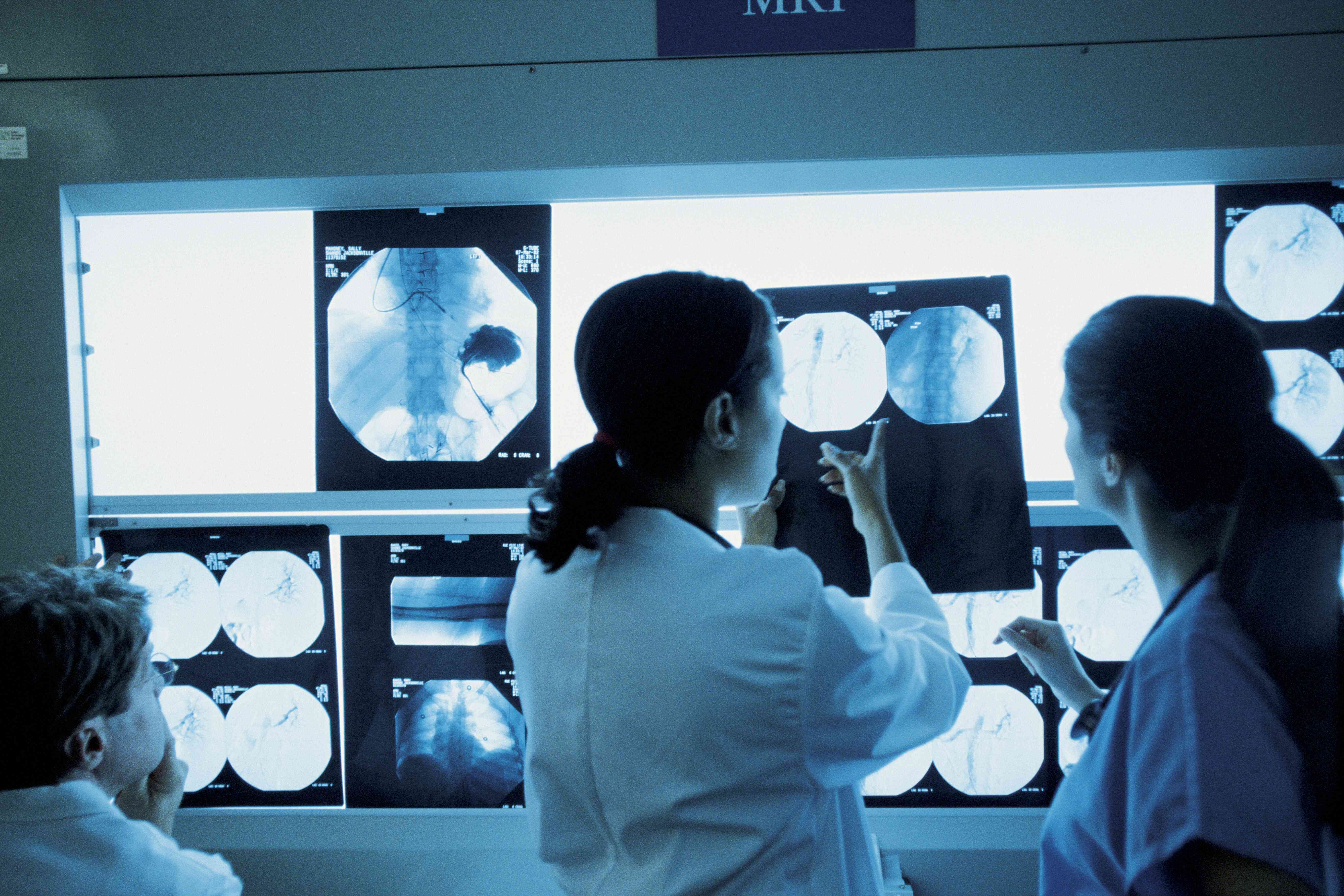
The Medical Technology Jobs Contributing to Industry Innovation
18 Dec, 202312 MinutesCombining technology and medicine can be a powerful tool for accelerating societal developme...

Combining technology and medicine can be a powerful tool for accelerating societal development. The innovation and intelligence associated with technology and the problem-solving aspects of medicine result in a formidable force for good, advancing healthcare diagnosis tools and equipment. Market growth is continuous, with a predicted rise of 4.73% globally in the next five years, displaying the current success of this ground-breaking partnership.
Future trend predictions highlight the importance of continuous medtech development to meet changing healthcare needs. But how are these medical technology jobs positively driving the current and future growth of the medical technology industry?
Our previous guide discussed the top five medical technology jobs' skills, qualifications and career progression opportunities. This guide aims to build on these ideas, focusing on the importance of these medtech roles and how they are and will impact the medical technology industry.
As a reminder, the medical technology jobs featured within this guide include:
- Biomedical Engineer
- Medical Device Software Engineer
- Biostatistician
- Quality Assurance Technician
- Clinical Research Associate
Why are Medtech Jobs Important?
Since 2010, the global medical technology market revenue has increased by more than 63%, illustrating the extent of its reach. Technology in healthcare is drastically improving how medical professionals can care for patients. Medical technology jobs combine a variety of industries and a considerable amount of multi-disciplinary knowledge from biology, computing and engineering, creating a powerful and innovative partnership for good.
The medical technology industry is responsible for developing, designing and developing patient care technologies, equipment for medical institutions, robotics, monitoring technologies and digital therapeutics. Every modern-day medical advancement involves medtech and many medical technology statisticians, engineers, technicians and research associates.
From technology that we utalise in our daily lives, like wearable technology that can track heart rate and blood glucose levels, to life extension technologies like gene technologies and cardiac pacemakers, medtech professionals are responsible. More recently, the development of artificial organs and other prosthetics has the potential to save thousands of lives, all while taking the strain away from the donor transplant list.
Biomedical Engineer
Biomedical engineers are experts in designing, developing and testing new medical devices and equipment. Biomedical engineering jobs are highly sought after. Their multi-disciplinary experience in biology, engineering and healthcare, combined with an understanding of current technologies, leaves them highly capable of understanding medical needs.
By applying engineering and biological principles to healthcare and biology, these medtech specialists strive to enhance the medtech industry and assist in patient treatment improvement. As the need for increased medical technology continues, biomedical engineers contribute to developing a diverse range of devices and equipment.
Why are Biomedical Engineers Important?
Solving complex issues and creating ground-breaking technologies is a biomedical engineer’s purpose. They are innovators in medical devices, medicine and tools. Aiming to make these technologies as accessible as possible, they study the biological processes of any medical signals of the body and medical issues to develop hardware that integrates easily.
The ability of biomedical engineers to understand human needs and combine them with real-time applications to improve human life is irreplaceable and essential to development. Here are some of their most vital responsibilities:
The Design and Development of Innovative Medical Technologies
Healthcare is a constantly changing industry that reflects the needs of its patients. Biomedical engineers play a large part in this, engaging in the needs of the healthcare industry to better understand development needs. Generally, their development and design skills are used in four primary areas of medical technology. These include:
- Clinical: Designing new equipment for medical facilities and providing tutorials on how to use that technology.
- Medical imagining: Designing, developing or perfecting any machines or technologies related to imagining.
- Medical devices: Designing and developing medical devices that assist a patient’s overall quality of life. These may include devices like pacemakers, contact lenses and diabetic equipment.
- Tissue engineering: Contributing to organ development and creation, including designing artificial organs.
Biomedical engineering jobs are one of the most important medical technology jobs. Their expert knowledge enables them to utilise mathematical principles and computer software to work within a wide range of medical technology development.
Collaboration and Practical Thinking
As well as successfully carrying out their complex job functions, biomedical engineers’ work helps other medical technology jobs fulfil their duties. Their designs and real-world understanding enable others to improve and analyse other issues within healthcare.
They collaborate with various medical professionals and computer science experts to gain a complete understanding of medical issues. This information creates innovative medical technology developments that fuel the future.
Problem-Solving
Despite the innovative and accessible outcomes, combining healthcare and technologically related disciplines isn’t easy. Addressing these issues and identifying multiple patient and medical needs requires knowledge in numerous fields.
Identifying patient healthcare challenges involves more than just data assessment. It requires emotional intelligence and empathy, which artificial intelligence can’t offer. In contrast, a skilled professional in medtech, like a qualified biomedical engineer, brings the human aspect to medical technology. They understand gaps in medical technology that could be developed to improve life and bring this to life.
What is their Future Impact?
As medicine develops rapidly, biomedical engineers will continue to bridge the gap between healthcare and other disciplines to benefit human life. Their research into human activity will enable the development of easily integrated technologies into human life, limiting any controversy that may stem from reliance on technology.
The design of specific technologies like tissue engineering and stem cell therapy will undoubtedly be crucial in future medical treatments. The development of reliable discoveries will assist in improving the efficiency of the healthcare industry. Biomedical engineers are increasingly vital in the future partnership of medicine and technology.
Medical Device Software Engineer
The use of medical software applications in medical devices is rising. A predicted market size of $8.2 billion by 2027 illustrates the frequency of software within medical devices.
Software systems that can control the functions of a device or technology. A medical devices software engineer is a fountain of knowledge regarding software design and implementation for other medical technology jobs. Their creation of accessible and user-friendly software can potentially contribute to important medical discoveries like breast cancer screening technologies.
Why are Medical Device Software Engineers Important?
Medical Device Software Engineers have the challenge of integrating this technical software and making it accessible to humans. They are leaders in software development, reliability, compliance, and integration in their industry, all while keeping device purposes in mind.
Medical device software engineers work on developing and improving the software that runs on the embedded system within medical devices. For a number of technologies, being able to work independently without human control is essential, especially medical diagnostic equipment. Medical device software engineers' coding, programming and troubleshooting skills are critical in forming functional medical devices that carry out a variety of tasks.
Medical device software engineers function within various sectors of the medical device industry. The common sectors include hospital institutions, medical device manufacturing, pharmaceutical companies and clinical research organisations. In all sectors, medical device software engineers aim to create software that allows devices and technologies to perform designated tasks and purposes. Here are some of their most crucial responsibilities:
Medical Device Software Development
Global technological development isn’t limited to the healthcare industry. Traditionally, medical devices and technologies in life sciences were limited to large, visibly complex, and inaccessible systems. While these technologies are still prominent in clinical settings, the modern healthcare industry requires various accessible developments.
Medical device software engineers are progressing with the times, assisting in developing more accessible, portable, and easy-to-manage medical technologies.
Software in medical devices generally falls into the below categories.
- Software as a Medical Device (SaMD): Software that is not directly part of the hardware of a medical device. They perform various functions, including data visualisation, storage, processing and interpretation. This includes mobile health apps.
- Software in a medical device (SiMD): The development of software that can’t run independently from its device. This includes the software in devices like pacemakers, where the software would be useless without the device.
- Software as an accessory to a medical device: The development of software that can complement a medical device's primary functions. This includes software for cochlear implant programming.
Creating and developing this software requires knowledge of programming languages to code, follow regulatory compliance, and test device software. Without medical device software engineers developing specialist software, medical devices would not be possible.
The Creation of Accessible and User-Friendly Software
Medical device software engineers assist in bridging the gap between medical data and complex technological interfaces and software. User-centred products and software are the core of their designs to ensure that end-users can utalise the product's benefits, improving their quality of life.
To develop software that can live up to our technological standards, medical device software engineers must have an in-depth knowledge of technology's abilities and be emotionally intelligent to keep human needs and expectations in mind. Of all medical technology jobs, their role focuses the most on software accessibility.
What is their Future Impact?
Expectations and the ability to produce advanced technologies are only growing in medtech. In addition, medical technologies need to be designed to communicate easily with us and integrate well into our daily lives, which will only increase with future complex advancements.
Biostatistician
Biostatisicans function across the clinical trial stage of the development of medical technologies. They have a wide range of responsibilities that are key within every aspect of the medtech industry.
Traditionally, their duties were limited to randomising and designing clinical trials, but their role has developed with the sector's development. From data management and analysis to interpretation of results and safety monitoring, the role of a biostatistician is expanding.
Why are Biostatisticians Important?
All medical technology developments are subject to a series of clinical trials.
Successful clinical trials are the key to successful medical technologies. The increasing volume of data that can inform healthcare decisions makes it increasingly more complex to draw meaning from it. A biostatistician combines their in-depth knowledge of biology and statistical analysis to monitor, analyse, and recognise trends in data.
Traditionally, biostatisticians are needed from the early clinical trial stages to technology development due to the complexity and volume of data. Their experience validating diagnosis tests and clinical trial analysis means their expertise is invaluable in improving patient care. Here are some of their most important responsibilities:
Trial Design and Randomisation Procedures
Given the importance of data in medical technology developments, it is unsurprising that the structure and design of the process that creates a large amount of this data is so significant. Biostasticans ensure the scientific validity of a clinical trial by reducing bias through the implementation of randomisation procedures. Their statistical calculation of clinical sample sizes also optimises the meaningful statistics gained and reinforces credibility.
Optimising the trial size and randomisation policies can ensure the correct amount of data is gained to proceed with the development and prevent any unnecessary costs associated with trial reproduction.
Data Trends and Interpretation
All aspects of medical technology jobs rely on how data is interpreted to inform medical decisions. Biostatisticians try to make sense of the voluminous data to determine its statistical significance. These medtech professionals analyse data trends during data analysis to understand the relationship between specific variables. Combining this information and data visualisation techniques enables biostatisticians to evaluate raw data and present accessible data to other medical professionals.
Biostatisticians are also responsible for creating a Statistical Analysis Plan (SAP), which enhances the transparency of the trial. The SAP contains a variety of procedures for how trial data will be analysed to ensure efficiency. This allows for easier predictability of trial results, improving medtech development.
What is their Future Impact?
As long as medical technology and regulations exist surrounding its activities, biostatisticians will continue to make and ensure impactful work. From providing the safety of clinical trials and medical technologies to designing studies and analysing trial data, biostatisticians will continue to be a vital aspect of the medtech industry as it grows and develops.
Quality Assurance Technician
Medical technology and technological developments must be regulated to ensure successful and legal work. An increasing number of medical technology jobs focus on regulations, but quality assurance technicians follow these regulations when testing and ensuring all medical devices are safe. Most industries employ quality assurance technicians, especially if they are working in technology, an industry of continuous development.
In medical technology, specific policies and procedures are implemented to ensure all technological developments follow law and industry-relevant regulations. Quality assurance technicians monitor these regulations to enforce positive effects on the industry.
Why are Quality Assurance Technicians important?
Medical technology is a large industry that involves many projects for different purposes. Quality assurance technicians are needed within every project, from clinical data to medical device manufacturing.
Their general responsibilities range from monitoring regulatory compliance and writing reports to determining product reliability and providing training on industry standards.
In short, quality assurance technicians are responsible for ensuring the safety of medical devices and technologies to ensure they carry out their desired function. A selection of their most crucial responsibilities include:
Quality Management Systems (QMS) Implementation
Quality management systems are processes and procedures that medical technology organisations establish to guarantee that their developments meet all regulatory requirements. QMS are thorough with multiple components, including regulations for suppliers, staff, documents and data
The primary purpose of quality assurance technicians in medical technology is to ensure all data and technical developments function in line with industry best practices. These professionals work to implement QMS procedures across all stages of technology design and development, including all stages containing data. This involves having expert knowledge of up-to-date industry regulations and medical technology development processes.
Implementing systems and procedures that assist in the quality management of intelligent and critical devices will always be necessary.
Safe Medical Technology Practices
Medical technology is a high-risk industry where the safety of patients and medical staff is increasingly important. With an increase in regulations surrounding more aware technology, it is unsurprising that quality assurance technicians are needed not only to ensure technologies are up to standard in a product sense but also in a safety sense.
Ensuring patient safety has to be a key priority for organisations developing medical technologies that are personally invasive. Though most medical tech developments like pacemakers have been successful, increasing focus on 3D printing, artificial organs, and more advanced technologies need continuous safety checks.
A quality assurance technician’s role echoes this. Implementing specific procedures during clinical trial risk assessments and medical device quality evaluation ensures participants and patients are safe.
What is their Future Impact?
There will not be a need for regulations. The security around ensuring products, medicines and technologies are safe is invaluable. Quality assurance technicians continuously promote this security.
While medical technology organisations and projects are regulated, more recent and advanced technologies like AI will have even stricter regulations surrounding their distribution. In the future years of development in this industry, quality assurance technicians' product inspection, testing and compliance reviews will maintain the high standards of medical technology.
Clinical Research Associate
While clinical research associates do not design or create medical technologies themselves, all medical technology jobs rely on the success of the clinical trial stage. Their roles consist of overseeing the conduction of all clinical trials related to medical technology. This assists in the success of the trial overall.
The coordination of a study relies on a clinical research associate's ability to assess any benefits or risks of the medical technology trial in question. Their combination of soft and industry-relevant skills allows them to communicate with other medical professionals to collect clinical data.
Why are Clinical Research Associates Important?
The clinical trial process is one of the most significant aspects of the development of medtech. The clinical trial stage is a rigorous process, containing multiple stages before they can reach patients. Clinical research associates play an increasingly important part in this process. From planning clinical trials to identifying participants to following patient safety regulations to collecting data, clinical research associates are essential organisers. Their most crucial responsibilities include:
Trial Oversight and Quality Control
A clinical trial isn't able to run itself. Specific measures and structures need to be in place to function. If a clinical trial is successful, the development, implementation, manufacturing and distribution stages begin. In contrast, if specific regulations are not met due to trial data quality, these stages cannot start. This includes making sure all participants are safe and follow specific control guidelines.
From the monitoring of site trials to ethical compliance examination, a clinical research associate is present in every stage.
Communication
Like most medical technology jobs, clinical research associates are known for communicating with other medical professionals. While communication is seen as a soft skill, ensuring trial success during clinical data collection is essential. Clinical research associates are also responsible for communicating between trial organisers, participants, and the site manager to establish safety and control rules.
What is their Future Impact?
Clinical research associates will always be needed within the clinical trials process and, therefore, the medical technology industry overall. With an annual growth rate of 5.9%, the medtech industry continues to expand and grow. For clinical research assistants, this means a rise in roles to monitor and develop clinical trial activity successfully.
Impactful Medical Technology Jobs: Final Thoughts
The combination of healthcare and technology continues to be the cause of current medical transformative advancements, shaping the industry's future. The industry’s predicted growth presents the significance of the collaboration of both sectors. This promising future environment is driven by the contributions of specific medical technology jobs, whose skills and multi-disciplinary experience play a key role in healthcare innovation and development.
Looking at crucial roles in this landscape reveals their essential role in bridging the gap between medical data and complex technological interfaces. Each position participates in maximising the level of accessibility these devices have to ensure maximum use. These skilled professionals stand out in the medical technology industry as each role is committed to problem-solving or streamlining medical processes.
As the industry evolves, these medical technology jobs will be required more than ever to look to the future. They are becoming critical professionals in designing systems and devices that seamlessly integrate into our lives and solve fundamental industry problems.
Experts in Medical Technology Recruitment
Since 2016, our expert life science recruitment consultants have been passionate about connecting top talent with the most innovative medtech companies. We are committed to remaining up-to-date with the latest medical technology developments so that we can support you in your journey.
Our growing global network of the latest exciting medical technology jobs means that we are well-equipped to assist you in your career journey.
Contact us today to discuss how we can assist you in finding the most recent life science vacancies.


